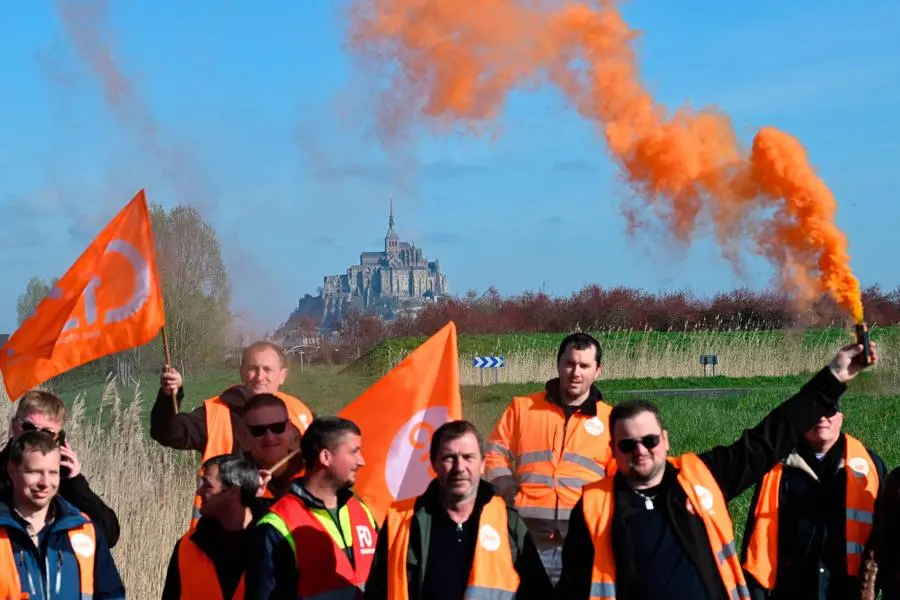PHOTO
Hundreds of thousands marched across France on Thursday against President Emmanuel Macron's pensions overhaul, but turnout fell during the final day of protests before a key court decision on the legislation.
There were new violent clashes between police and protesters in western France, while demonstrators also stormed the headquarters of the French luxury goods conglomerate LVMH in Paris.
All eyes will turn Friday to the Constitutional Council, France's highest administrative authority, which will announce its verdict on the pension legislation, the final hurdle before Macron can sign it into law.
The protest march in Paris passed by the Constitutional Council's headquarters, opposite the Louvre museum in central Paris, which was protected by a phalanx of anti-riot police in body armour brandishing shields.
The interior ministry said 380,000 people took part in rallies nationwide, far fewer than the nearly 1.3 million who demonstrated in March at the height of the protests against the reforms, which include raising the retirement age from 62 to 64.
Sophie Binet, the newly installed chief of the hard-left CGT union, claimed a much higher turnout of 1.5 million people, but that was still far lower than the union's estimate of 3.5 million on the sixth day of protests last month.
- Losing momentum? -
If the court largely approves the pension changes -- as ministers are privately confident it will -- Macron hopes to sign the changes into law immediately, clearing the way for them to enter into force before the end of 2023.
Having repeatedly snubbed calls for talks with union leaders in recent weeks, Macron said he would invite labour representatives for discussions once the court decision was published.
"The decision from the Constitutional Council on Friday will bring an end to the democratic and constitutional procedures," Macron told reporters on a trip to the Netherlands on Wednesday, adding that public debate "will continue, for sure".
Paris police have banned any further demonstration around the Constitutional Council until Saturday morning.
Strike momentum has been waning since the start of the movement in January, with employees reluctant to sacrifice salaries for what seems to many a losing battle.
Most trains were running on Thursday at state rail operator SNCF and the Paris public transport provider RATP, past bastions of strike participation.
But the movement is "far from over", said the head of the CFDT union Laurent Berger as the demonstration got under way in Paris, vowing major protests on the May 1 labour day.
The CGT has called for new strikes by refinery workers and rubbish collectors, whose walkout left the streets of Paris heaving with trash for three weeks in March.
A Mercedes car and bins were set on fire in the western city of Rennes, while protesters and police clashed in Nantes, a flashpoint of tension in recent weeks, with security forces using tear gas, AFP reporters said.
In Paris, police stood in formation outside the central bank and fired teargas to disperse protesters, an AFP photographer saw.
Protesters earlier briefly occupied the headquarters of LVMH on the glitzy Avenue Montaigne in the centre of the capital and set off smoke flares.
In the evening, the capital's police said it had made 36 arrests.
- 'Make French model sustainable' -
"Mobilisation must continue because this bill cannot see the light of day," Manuel Bompard, a leading lawmaker for hard-left opposition party France Unbowed, told broadcaster France 2 on Thursday.
The Constitutional Council, whose members are known as "the wise ones", has the power to block parts of the legislation or even reject it wholesale.
Surveys show that about two in three French people are against the pension changes, which Macron says are essential to stop the system falling into heavy deficits in coming decades.
Critics accuse the president of riding roughshod over public opinion and parliament, where the minority government invoked controversial executive powers to ram the legislation through without a vote at the end of March.
"I'm proud of the French social model and I defend it, but if we want to make it sustainable, we have to produce more," Macron said in the Netherlands.





















